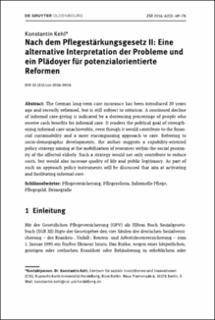Please use this identifier to cite or link to this item:
https://doi.org/10.21256/zhaw-26558Full metadata record
| DC Field | Value | Language |
|---|---|---|
| dc.contributor.author | Kehl, Konstantin | - |
| dc.date.accessioned | 2023-01-11T11:05:54Z | - |
| dc.date.available | 2023-01-11T11:05:54Z | - |
| dc.date.issued | 2016 | - |
| dc.identifier.issn | 0514-2776 | de_CH |
| dc.identifier.issn | 2366-0295 | de_CH |
| dc.identifier.uri | https://digitalcollection.zhaw.ch/handle/11475/26558 | - |
| dc.description.abstract | The German long-term care insurance has been introduced 20 years ago and recently reformed, but is still subject to criticism. A continued decline of informal care-giving is indicated by a decreasing percentage of people who receive cash benefits for informal care. It renders the political goal of strengthening informal care unachievable, even though it would contribute to the financial sustainability and a more encompassing approach to care. Referring to socio-demographic developments, the author suggests a capability-oriented policy strategy aiming at the mobilization of resources within the social proximity of the affected elderly. Such a strategy would not only contribute to reduce costs, but would also increase quality of life and public legitimacy. As part of such an approach policy instruments will be discussed that aim at activating and facilitating informal care. | de_CH |
| dc.language.iso | de | de_CH |
| dc.publisher | De Gruyter | de_CH |
| dc.relation.ispartof | Zeitschrift für Sozialreform | de_CH |
| dc.rights | Licence according to publishing contract | de_CH |
| dc.subject | Pflegeversicherung | de_CH |
| dc.subject | Pflegereform | de_CH |
| dc.subject | Informelle Pflege | de_CH |
| dc.subject | Pflegegeld | de_CH |
| dc.subject | Demografie | de_CH |
| dc.subject.ddc | 360: Soziale Probleme und Sozialversicherungen | de_CH |
| dc.title | Nach dem Pflegestärkungsgesetz II : eine alternative Interpretation der Probleme und ein Plädoyer für potenzialorientierte Reformen | de_CH |
| dc.type | Beitrag in wissenschaftlicher Zeitschrift | de_CH |
| dcterms.type | Text | de_CH |
| zhaw.departement | Soziale Arbeit | de_CH |
| zhaw.organisationalunit | Institut für Sozialmanagement (ISM) | de_CH |
| dc.identifier.doi | 10.1515/zsr-2016-0006 | de_CH |
| dc.identifier.doi | 10.21256/zhaw-26558 | - |
| zhaw.funding.eu | No | de_CH |
| zhaw.issue | 1 | de_CH |
| zhaw.originated.zhaw | No | de_CH |
| zhaw.pages.end | 78 | de_CH |
| zhaw.pages.start | 49 | de_CH |
| zhaw.publication.status | publishedVersion | de_CH |
| zhaw.volume | 62 | de_CH |
| zhaw.publication.review | Peer review (Publikation) | de_CH |
| zhaw.author.additional | No | de_CH |
| zhaw.display.portrait | Yes | de_CH |
| Appears in collections: | Publikationen Soziale Arbeit | |
Files in This Item:
| File | Description | Size | Format | |
|---|---|---|---|---|
| 2016_Kehl_Nach-dem-Pflegestaerkungsgesetz-II.pdf | 379.48 kB | Adobe PDF |  View/Open |
Show simple item record
Kehl, K. (2016). Nach dem Pflegestärkungsgesetz II : eine alternative Interpretation der Probleme und ein Plädoyer für potenzialorientierte Reformen. Zeitschrift für Sozialreform, 62(1), 49–78. https://doi.org/10.1515/zsr-2016-0006
Kehl, K. (2016) ‘Nach dem Pflegestärkungsgesetz II : eine alternative Interpretation der Probleme und ein Plädoyer für potenzialorientierte Reformen’, Zeitschrift für Sozialreform, 62(1), pp. 49–78. Available at: https://doi.org/10.1515/zsr-2016-0006.
K. Kehl, “Nach dem Pflegestärkungsgesetz II : eine alternative Interpretation der Probleme und ein Plädoyer für potenzialorientierte Reformen,” Zeitschrift für Sozialreform, vol. 62, no. 1, pp. 49–78, 2016, doi: 10.1515/zsr-2016-0006.
KEHL, Konstantin, 2016. Nach dem Pflegestärkungsgesetz II : eine alternative Interpretation der Probleme und ein Plädoyer für potenzialorientierte Reformen. Zeitschrift für Sozialreform. 2016. Bd. 62, Nr. 1, S. 49–78. DOI 10.1515/zsr-2016-0006
Kehl, Konstantin. 2016. “Nach dem Pflegestärkungsgesetz II : eine alternative Interpretation der Probleme und ein Plädoyer für potenzialorientierte Reformen.” Zeitschrift für Sozialreform 62 (1): 49–78. https://doi.org/10.1515/zsr-2016-0006.
Kehl, Konstantin. “Nach dem Pflegestärkungsgesetz II : eine alternative Interpretation der Probleme und ein Plädoyer für potenzialorientierte Reformen.” Zeitschrift für Sozialreform, vol. 62, no. 1, 2016, pp. 49–78, https://doi.org/10.1515/zsr-2016-0006.
Items in DSpace are protected by copyright, with all rights reserved, unless otherwise indicated.